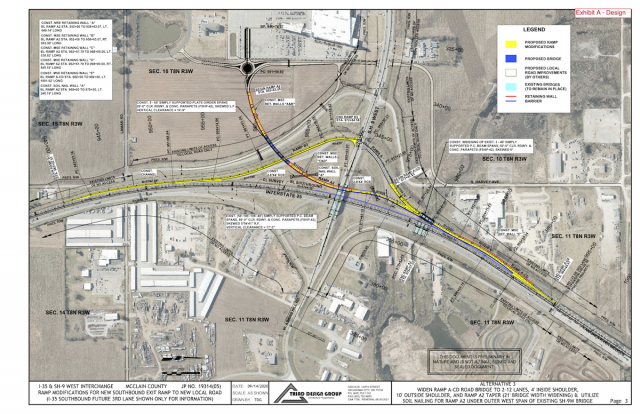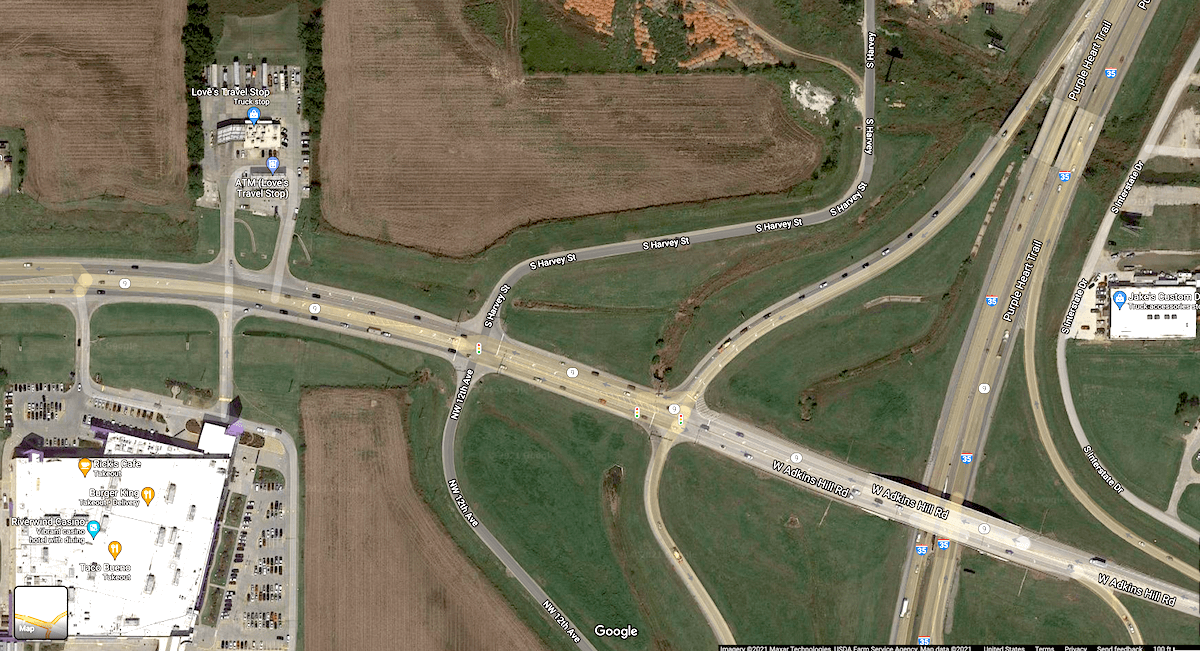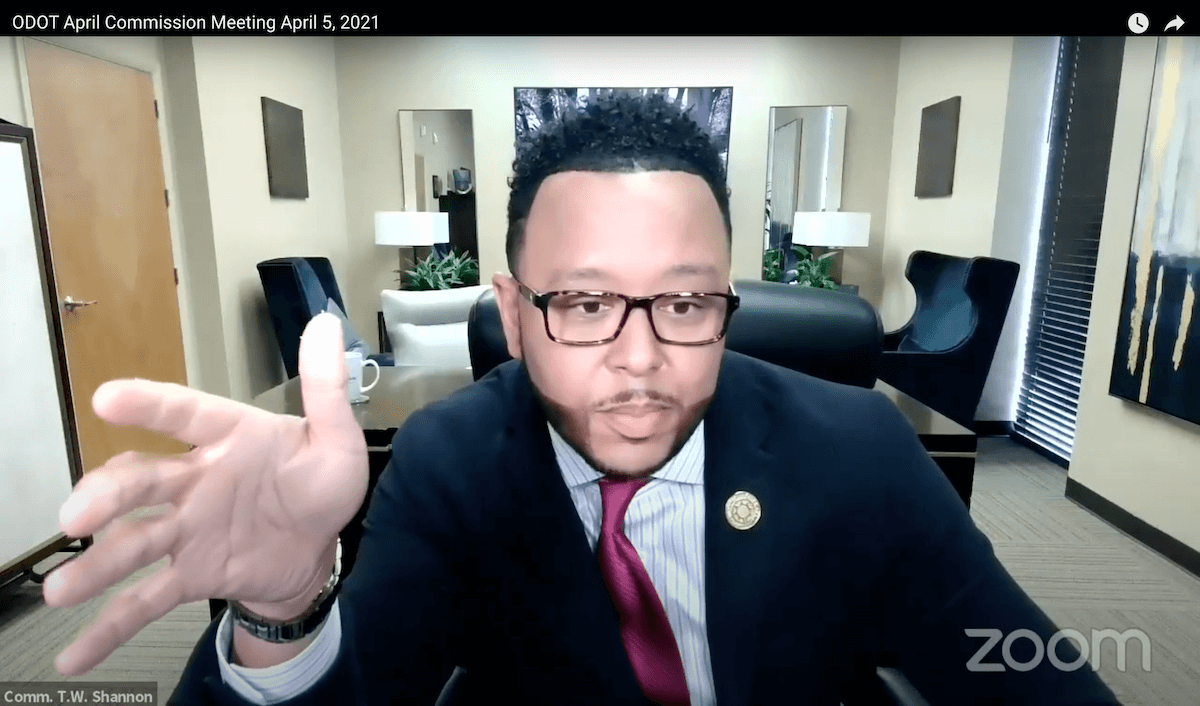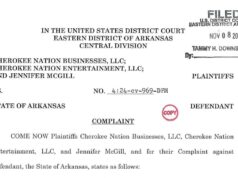
(Update: On Monday, May 3, the Oklahoma Transportation Commission voted 2-7 against both Item 69 and Item 70, as detailed in the article below.)
The original agreement for improvements to a State Highway 9 and Interstate 35 interchange included construction of a flyover ramp from I-35 to a new roundabout that would connect to the Chickasaw Nation’s Riverwind Casino parking lot, a document obtained from the Oklahoma Department of Transportation shows.
That component of the now-delayed interchange redesign has been criticized by Gov. Kevin Stitt’s administration as a “pet project,” despite the Chickasaw Nation’s commitment of $10 million of the total $17 million estimated cost.
But Stitt told NonDoc in April that the project’s design caught his attention because it will be taking “taxpayer dollars and building an exit directly to the front door of a casino.”
“I’ve got some questions about where that came from and want to make sure that that’s the right place for tax dollars to be building roads,” Stitt said.
The Highway 9 West and I-35 interchange is busy, with southbound traffic often backing up along I-35 as motorists face a pair of stoplight intersections as they exit west, either for the casino or toward the growing Blanchard and Newcastle areas.
“The traffic that I see and I experience personally living about 12 miles from there is from Monday through Friday, people coming home from work and going home,” said Oklahoma Transportation Commissioner T.W. Shannon. “That intersection is an issue because of the growth in that area and not just the industry that is there.”
Shannon is a Chickasaw citizen and the CEO of Chickasaw Community Bank, a wholly owned subsidiary of the Chickasaw Nation, which had its tribal reservation affirmed by the Oklahoma Court of Criminal Appeals in March, about nine months after the historic U.S. Supreme Court ruling in McGirt v. Oklahoma.
At the Oklahoma Transportation Commission’s April 6 meeting, Shannon asked a series of impassioned questions to Secretary of Transportation Tim Gatz about why a March kickoff conference for the project had been canceled. Shannon said he feared “political pressure” had played a factor, something the state’s widely touted “eight-year plan” for highway projects is supposed to prevent.
Oklahoma Transportation Commission meeting
When: 11 a.m. Monday, May 3
Where: 200 N.E. 21st St., OKC
Agenda: Click here
Stream: Click here
“The parties and ODOT both agreed on the project as is, so the idea that we would now change it in the 11th hour, that gave me great pause,” Shannon said. “People make investments in roads and bridges, and uncertainty creates a certain amount of cost.”
At the April meeting, Shannon requested that Gatz make a presentation about the Highway 9 project at the commission’s May 3 meeting. On Monday’s meeting agenda, that presentation is listed as Item 68, with Item 69 proposing a resolution from Shannon supporting the eight-year plan and stating that “the Oklahoma Department of Transportation supports cooperation with local partners, including sovereign federally recognized nations, to build and repair roads and bridges in this state.”
Item 70 is a request by Shannon for an Oklahoma attorney general’s opinion on how the McGirt ruling affects ODOT projects and agreements, a question Shannon asked Gatz multiple times in April, to which Gatz emphasized “uncertainty” as the primary concern.
Stitt said he believes the property questions raised by the Muscogee (Creek), Cherokee, Choctaw, Seminole and Chickasaw nations being Indian Country reservations as defined under 18 U.S.C. 1151a mean his administration needs to consider all potential legal expansions of the U.S. Supreme Court case. (For instance, the Oklahoma Tax Commission is already receiving official protests from some tribal citizens who live and work within reservation boundaries, and the U.S. Department of Interior has already notified Oklahoma that it is asserting exclusive federal jurisdiction over surface coal mining and reclamation activities.)
“We need to approve every compact, every agreement, and the Legislature has a joint committee that needs to give it a thumbs up or a thumbs down,” Stitt said. “So the governor negotiates compacts, and then the joint committee will give it an up or down. So we need to look at all those agreements.”
Asked if he was believes ODOT’s partnerships on highway projects with tribal nations need to be formalized into “compacts,” Stitt treaded more carefully than he had when pursuing new gaming compacts, which were overturned by the courts.
“I don’t know if I would call it a compact, but I am certainly going to look at every deal, and I encourage the Department of Transportation to look at every deal,” Stitt said.
McCaleb: ‘We were caught off guard and disappointed’

Neal McCaleb, a Chickasaw citizen who served concurrently as ODOT’s director and the state’s first secretary of transportation in the 1980s, said the Chickasaw Nation and ODOT had collaborated productively for three years to prepare the State Highway 9 West project, which he said should not have been delayed.
“Honestly, we were caught off-guard and disappointed in the sudden decision. We did not receive any explanation or discussion before the customary project kickoff conference,” said McCaleb, a former Republican member of the Oklahoma House. “We had allocated our $10 million for the project. We understood the state and federal governments were splitting the remaining $7 million 80/20. The state’s portion of this project is $1.4 million.”
McCaleb also noted that the Chickasaw Nation had proposed donating more than eight acres of nearby land — valued at more than $1.5 million in 2016 — for right-of-way access owing to the project’s importance.
“The interchange is incapable of handling the current volume of traffic safely, especially during morning and evening rush hours when traffic to our gaming and entertainment facility, Riverwind, is modest,” said McCaleb, a civil engineer by training. “We recognize that our successful operation has increased traffic count over the years. The most significant contributor to the steady increase in the traffic count is the considerable population growth in the surrounding area. As a partner in the project with the state, we believe shouldering most of the project costs was the right thing to do. We have enjoyed a productive partnership with [ODOT] for decades. Shared goals have always unified us — to invest in roads and bridges, improve public safety, and benefit all Oklahomans through efficient traffic flow.”
For those traveling from Norman, Moore or Oklahoma City to the Chickasaw Nation’s Riverwind Casino, the proposed flyover ramp would be efficient.
Shannon said he was aware of the project details, although he could not think of seeing anything similar to the proposed flyover ramp where a private enterprise’s customer traffic was designed into an ODOT project.
“I don’t know that I’ve seen anything like that before, but I do know this: When you look at the traffic data, there needs to be a change there,” Shannon said. “And the fact that the Chickasaws are paying $10 million of the $17 million cost, that tells me that is a good public-private partnership between ODOT (and the Chickasaw Nation).”
Shannon, a former Republican legislator who served as chairman of the House Transportation Committee and then speaker of the Oklahoma House, said he believes the project is in line with the state’s other I-35 corridor efforts.
“The eight-year plan has always been about safety and priority. I’ve never ever heard that any project that made the eight-year plan in my time at the Legislature was based on anything other than need, priority and safety,” he said. “So if there’s some other indication or insinuation that there’s a project on there for something else, I would be very surprised.”
Legislative leaders recognize need for a project
Shannon was appointed to the Transportation Commission by House Speaker Charles McCall (R-Atoka), who said Thursday that he is “very confident” that Shannon “is executing and discharging the duties of his commission to the best of his ability.”
“There is nothing wrong with having discussions. We get that,” McCall said. “This is where (state law has) decentralized power out of one particular office into an agency commission and (we) appoint people to go do what’s best for the state of Oklahoma.”
But McCall, his House Republican Caucus and the State Senate allowed Stitt greater centralized power in 2019 by passing historic reforms of five key agencies, including ODOT. That means Gatz’s position as ODOT director is now hired and fired by the governor instead of the commission.
Gatz said the I-35 and Highway 9 West project is important, but he downplayed the proposed casino flyover ramp’s role in his agency’s decision to re-examine the situation.
“There’s a big need there at (Highway) 9 West, so you have to take a comprehensive look at the interchange, and the access to the local road system is part of it, but not all of it,” Gatz said. “There’s more of a comprehensive solution there. That’s some of the things we’ll talk about at [today’s] commission meeting.”
RELATED
T.W. Shannon concerned ‘political pressure’ may be delaying tribal highway projects by Tres Savage
Gatz called the document provided to NonDoc showing the flyover ramp “just a concept.”
“We’re still going to have a project there. We’re going to have to,” he said. “It’s just working through the details. Everything is on the table because, again, we’ve got some work left to do.”
Shannon, McCaleb and others thought enough work had been done to formalize a plan, not just a concept.
“The only thing I heard at the last meeting was that the uncertainty was caused by McGirt, but that’s inconsistent with everything I’ve heard coming out of the (governor’s) mansion,” Shannon said. “The executive’s office has been very clear — and the Supreme Court was also clear — that McGirt only relates to actions of criminal jurisdiction, not civil. So how that would affect roads and bridges, I’m still unsure. But, in fairness, I haven’t heard ODOT’s explanation yet either. There may be a good explanation.”
McCaleb attributed the planned project’s design to ODOT engineers.
“ODOT’s design includes a ramp connecting to a roundabout to facilitate the relocation of the second traffic light on State Highway 9. The second traffic light is a major cause of the backups on I-35,” he said. “ODOT determined this design met the public safety and efficient traffic flow goals for this interchange project after many helpful meetings.”
He said the flyover ramp “to a proposed new local road” abutting the casino “will facilitate the relocation of the two traffic lights” that cause backups along I-35.
“We understand ODOT had completed 60 percent of the engineering elements on this interchange project before the canceled project kickoff conference,” McCaleb said. “We remain committed to the design put forth by ODOT and are hopeful it will move forward sooner rather than later for the safety of the tens of thousands of Oklahomans driving through this interchange daily.”
House Minority Leader Emily Virgin (D-Norman) said she has seen the need for changes at the I-35 and Highway 9 West interchange “pretty much every day.”
“I exit a little bit before that when I go home, to Highway 9 East, and it is usually backed up all that way,” Virgin said. “I’ve often thought that something needs to be done about that exit ramp, because it clearly isn’t meeting the needs of that exit.”
Virgin described the project’s delay over supposed legal uncertainty as “unfortunate” for citizens who just want traffic congestion to be relieved.
“That is what we see a lot of going on in government right now — these non-transparent ways of doing things. A lot of the facts haven’t been out in the open, and so you had a board member who was talking about this (in a public meeting),” Virgin said. “I think it’s unfortunate that all of the facts haven’t come to light and it was changed without a lot of notice to the public.”
Virgin said she also does not know what public input went into the proposed project design that features a flyover ramp to Riverwind Casino.
“I know the people who are getting off the interstate there are not all going to the casino,” Virgin said. “So I’m not sure it makes sense to funnel straight to the casino. But, of course, if the Chickasaw Nation is putting in some of the funding for it, they are going to ask for something in return.”






















